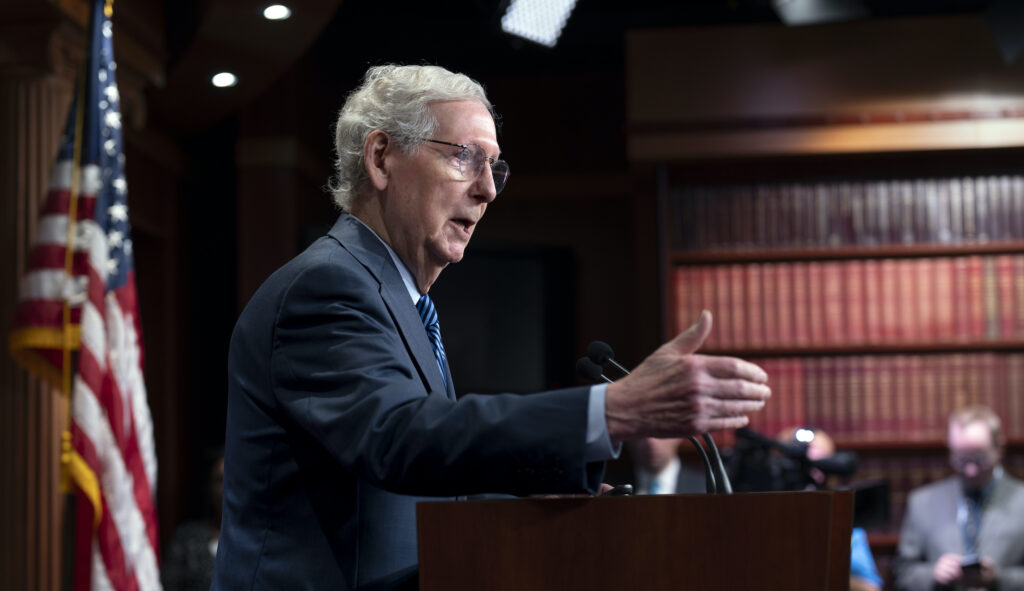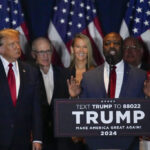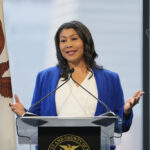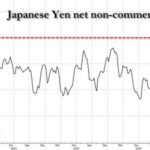
Senate Minority Leader Mitch McConnell (R-KY) delivered an unmistakable rebuke of the Republicans opposed to further funding for Ukraine on Tuesday.
He brought along 31 GOP votes for the legislation, nine more than voted for an earlier version of the legislation in February and, most significantly, a majority of his conference in the Senate.
He denies that the victory, which seemed very much in doubt just two months earlier, has personal significance. He is stepping down as Republican leader at the end of the year and as one of his final acts resolved to get the foreign aid, which also includes money for Israel and Taiwan, through Congress.
“This is not about me. This is about our country and the free world,” he told reporters at a press briefing Tuesday afternoon.
But McConnell in no uncertain terms framed the vote as an inflection point in a raging battle between two wings of the party: the Republicans carrying the traditional mantle of “peace through strength” and those who view foreign intervention with deep skepticism.
“I think we’ve turned the corner on the isolationist movement,” he declared, at another point adding, “I won’t say it’s gone away, but we certainly prevailed.”

It was a long road for McConnell to get the aid passed. He pursued and then was forced to abandon a border deal seen as the key to unlocking support in the Republican-led House, and it took months of cajoling Speaker Mike Johnson (R-LA), who gave the $95 billion package a floor vote after repeated intelligence briefings and two sit-downs at the White House.
Donald Trump proved to be the biggest roadblock. He helped tank the border deal, viewing it as a political victory for his 2024 rival, President Joe Biden, in an election year. But the former president ultimately relented, acquiescing to a border-free bill so long as its $9 billion in economic assistance was restructured as a “forgivable loan.”
The compromise reflected Trump’s continued sway over the GOP as he mounts a third run for president. He shaped the opposition, infused with his brand of “America First” populism, but left a path for McConnell, one of his biggest Republican antagonists, to succeed.
McConnell endorsed Trump for president but only after he locked up the GOP nomination.
It also reflects a feature of the Senate leader’s decadeslong career in the Senate: strategic patience. McConnell cobbled together the votes needed for the foreign aid to pass, outlasting the heated passions of the Republican House.
In the hours before the vote on foreign aid, Senate Republican offices received a memo rebutting the claims made by Ukraine critics.
There could be consequences for Johnson. He faces the threat of his ouster from hard-line Republicans livid over the Ukraine vote. But the pleas from McConnell and every other party leader, made in public and private, proved persuasive enough to change his mind.
Before becoming speaker in October, Johnson had been a Ukraine skeptic.
Sen. J.D. Vance (R-OH), who since arriving in the Senate last year has become the most outspoken opponent of Ukraine aid, has his eye on the long game as well. About a third of Senate Republicans voted against the aid on Tuesday, and he has campaigned for candidates including Bernie Moreno in Ohio who would espouse similar views.
He sees a future in which the Republican majority does not get into conflicts without a “strategic vision” for how to get out.
“I think we have to slowly win the argument for a more rational foreign policy with our colleagues, and it’s going to take a long time,” Vance told the Washington Examiner.
McConnell declined to address Vance’s critiques of the Ukraine package, laid out in a New York Times op-ed earlier this month. But he conceded he was fighting a battle that extended far beyond the halls of Congress.
At his press conference, McConnell blamed political pundits including Tucker Carlson for souring public sentiment on Ukraine. Fifty-seven percent of Republicans think the United States is doing “too much” to help the country with its war against Russia, according to the latest Gallup poll.
“Mitch might be able to twist a few arms here to change a few votes. But look, the majority of the Republican voting population doesn’t want us to write unlimited blank checks to Ukraine,” said Vance.
“I think we fundamentally won the argument amongst the country,” he added.
CLICK HERE TO READ MORE FROM THE WASHINGTON EXAMINER
That battle will continue to play out over the coming years. Trump, who wants to see European allies contribute more toward their own defense, could set the terms for debate if he becomes president, while McConnell, through his affiliated leadership PACs, is ironically helping elect what may be a fresh wave of Republican senators aligned with the former president.
But McConnell, who has delivered repeated floor speeches insisting that foreign engagement is in America’s national interest, has simultaneously panned the “America First” movement as a passing fad and has vowed to oppose it for as long as he is serving in the Senate. The 82-year-old senator says he intends to complete the remainder of his term as a rank-and-file member through 2026.







